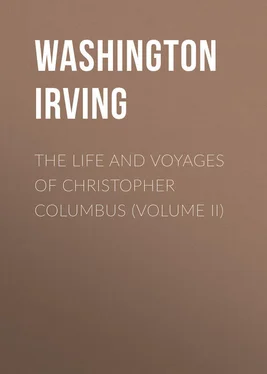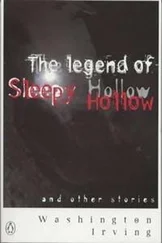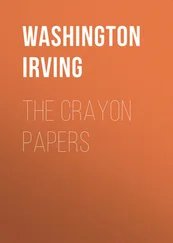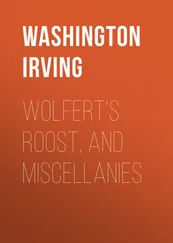Washington Irving - The Life and Voyages of Christopher Columbus (Volume II)
Здесь есть возможность читать онлайн «Washington Irving - The Life and Voyages of Christopher Columbus (Volume II)» — ознакомительный отрывок электронной книги совершенно бесплатно, а после прочтения отрывка купить полную версию. В некоторых случаях можно слушать аудио, скачать через торрент в формате fb2 и присутствует краткое содержание. Жанр: foreign_antique, foreign_prose, на английском языке. Описание произведения, (предисловие) а так же отзывы посетителей доступны на портале библиотеки ЛибКат.
- Название:The Life and Voyages of Christopher Columbus (Volume II)
- Автор:
- Жанр:
- Год:неизвестен
- ISBN:нет данных
- Рейтинг книги:5 / 5. Голосов: 1
-
Избранное:Добавить в избранное
- Отзывы:
-
Ваша оценка:
- 100
- 1
- 2
- 3
- 4
- 5
The Life and Voyages of Christopher Columbus (Volume II): краткое содержание, описание и аннотация
Предлагаем к чтению аннотацию, описание, краткое содержание или предисловие (зависит от того, что написал сам автор книги «The Life and Voyages of Christopher Columbus (Volume II)»). Если вы не нашли необходимую информацию о книге — напишите в комментариях, мы постараемся отыскать её.
The Life and Voyages of Christopher Columbus (Volume II) — читать онлайн ознакомительный отрывок
Ниже представлен текст книги, разбитый по страницам. Система сохранения места последней прочитанной страницы, позволяет с удобством читать онлайн бесплатно книгу «The Life and Voyages of Christopher Columbus (Volume II)», без необходимости каждый раз заново искать на чём Вы остановились. Поставьте закладку, и сможете в любой момент перейти на страницу, на которой закончили чтение.
Интервал:
Закладка:
The person chosen to supersede Bobadilla was Don Nicholas de Ovando, commander of Lares, of the order of Alcantara. He is described as of the middle size, fair complexioned, with a red beard, and a modest look, yet a tone of authority. He was fluent in speech, and gracious and courteous in his manners. A man of great prudence, says Las Casas, and capable of governing many people, but not of governing the Indians, on whom he inflicted incalculable injuries. He possessed great veneration for justice, was an enemy to avarice, sober in his mode of living, and of such humility, that when he rose afterwards to be grand commander of the order of Alcantara, he would never allow himself to be addressed by the title of respect attached to it. 101 101 Las Casas, Hist. Ind., lib. ii. cap. 3.
Such is the picture drawn of him by historians; but his conduct in several important instances is in direct contradiction to it. He appears to have been plausible and subtle, as well as fluent and courteous; his humility concealed a great love of command, and in his transactions with Columbus he was certainly both ungenerous and unjust.
The various arrangements to be made, according to the new plan of colonial government, delayed for some time the departure of Ovando. In the meantime, every arrival brought intelligence of the disastrous state of the island, under the mal-administration of Bobadilla. He had commenced his career by an opposite policy to that of Columbus. Imagining that rigorous rule had been the rock on which his predecessors had split, he sought to conciliate the public by all kinds of indulgence. Having at the very outset relaxed the reins of justice and morality, he lost all command over the community; and such disorder and licentiousness ensued, that many, even of the opponents of Columbus, looked back with regret upon the strict but wholesome rule of himself and the Adelantado.
Bobadilla was not so much a bad as an imprudent and a weak man. He had not considered the dangerous excesses to which his policy would lead. Rash in grasping authority, he was feeble and temporizing in the exercise of it: he could not look beyond the present exigency. One dangerous indulgence granted to the colonists called for another; each was ceded in its turn, and thus he went on from error to error, – showing that in government there is as much danger to be apprehended from a weak as from a bad man.
He had sold the farms and estates of the crown at low prices, observing that it was not the wish of the monarchs to enrich themselves by them, but that they should redound to the profit of their subjects. He granted universal permission to work the mines, exacting only an eleventh of the produce for the crown. To prevent any diminution in the revenue, it became necessary, of course, to increase the quantity of gold collected. He obliged the caciques, therefore, to furnish each Spaniard with Indians, to assist him both in the labors of the field and of the mine. To carry this into more complete effect, he made an enumeration of the natives of the island, reduced them into classes, and distributed them, according to his favor or caprice, among the colonists. The latter, at his suggestion, associated themselves in partnerships of two persons each, who were to assist one another with their respective capitals and Indians, one superintending the labors of the field, and the other the search for gold. The only injunction of Bobadilla was, to produce large quantities of ore. He had one saying continually in his mouth, which shows the pernicious and temporizing principle upon which he acted: "Make the most of your time," he would say, "there is no knowing how long it will last," alluding to the possibility of his being speedily recalled. The colonists acted up to his advice, and so hard did they drive the poor natives, that the eleventh yielded more revenue to the crown than had ever been produced by the third under the government of Columbus. In the meantime, the unhappy natives suffered under all kinds of cruelties from their inhuman taskmasters. Little used to labor, feeble of constitution, and accustomed in their beautiful and luxuriant island to a life of ease and freedom, they sank under the toils imposed upon them, and the severities by which they were enforced. Las Casas gives an indignant picture of the capricious tyranny exercised over the Indians by worthless Spaniards, many of whom had been transported convicts from the dungeons of Castile. These wretches, who in their own countries had been the vilest among the vile, here assumed the tone of grand cavaliers. They insisted upon being attended by trains of servants. They took the daughters and female relations of caciques for their domestics, or rather for their concubines, nor did they limit themselves in number. When they traveled, instead of using the horses and mules with which they were provided, they obliged the natives to transport them upon their shoulders in litters, or hammocks, with others attending to hold umbrellas of palm-leaves over their heads to keep off the sun, and fans of feathers to cool them; and Las Casas affirms that he has seen the backs and shoulders of the unfortunate Indians who bore these litters raw and bleeding from the task. When these arrogant upstarts arrived at an Indian village, they consumed and lavished away the provisions of the inhabitants, seizing upon whatever pleased their caprice, and obliging the cacique and his subjects to dance before them for their amusement. Their very pleasures were attended with cruelty. They never addressed the natives but in the most degrading terms, and on the least offence, or the least freak of ill-humor, inflicted blows and lashes, and even death itself. 102 102 Las Casas, Hist. Ind., lib. ii. cap. 1, MS.
Such is but a faint picture of the evils which sprang up under the feeble rule of Bobadilla; and are sorrowfully described by Las Casas, from actual observation, as he visited the island just at the close of his administration. Bobadilla had trusted to the immense amount of gold, wrung from the miseries of the natives, to atone for all errors, and secure favor with the sovereigns; but he had totally mistaken his course. The abuses of his government soon reached the royal ear, and above all, the wrongs of the natives reached the benevolent heart of Isabella. Nothing was more calculated to arouse her indignation, and she urged the speedy departure of Ovando, to put a stop to these enormities.
In conformity to the plan already mentioned, the government of Ovando extended over the islands and Terra Firma, of which Hispaniola was to be the metropolis. He was to enter upon the exercise of his powers immediately upon his arrival, by procuration, sending home Bobadilla by the return of the fleet. He was instructed to inquire diligently into the late abuses, punishing the delinquents without favor or partiality, and removing all worthless persons from the island. He was to revoke immediately the license granted by Bobadilla for the general search after gold, it having been given without royal authority. He was to require, for the crown, a third of what was already collected, and one half of all that should be collected in future. He was empowered to build towns, granting them the privileges enjoyed by municipal corporations of Spain, and obliging the Spaniards, and particularly the soldiers, to reside in them, instead of scattering themselves over the island. Among many sage provisions, there were others injurious and illiberal, characteristic of an age when the principles of commerce were but little understood; but which were continued by Spain long after the rest of the world had discarded them as the errors of dark and unenlightened times. The crown monopolized the trade of the colonies. No one could carry merchandises there on his own account. A royal factor was appointed, through whom alone were to be obtained supplies of European articles. The crown reserved to itself not only exclusive property in the mines, but in precious stones, and like objects of extraordinary value, and also in dyewoods. No strangers, and above all, no Moors nor Jews, were permitted to establish themselves in the island, nor to go upon voyages of discovery. Such were some of the restrictions upon trade which Spain imposed upon her colonies, and which were followed up by others equally illiberal. Her commercial policy has been the scoff of modern times; but may not the present restrictions on trade, imposed by the most intelligent nations, be equally the wonder and the jest of future ages?
Читать дальшеИнтервал:
Закладка:
Похожие книги на «The Life and Voyages of Christopher Columbus (Volume II)»
Представляем Вашему вниманию похожие книги на «The Life and Voyages of Christopher Columbus (Volume II)» списком для выбора. Мы отобрали схожую по названию и смыслу литературу в надежде предоставить читателям больше вариантов отыскать новые, интересные, ещё непрочитанные произведения.
Обсуждение, отзывы о книге «The Life and Voyages of Christopher Columbus (Volume II)» и просто собственные мнения читателей. Оставьте ваши комментарии, напишите, что Вы думаете о произведении, его смысле или главных героях. Укажите что конкретно понравилось, а что нет, и почему Вы так считаете.












